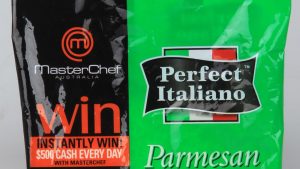
But if you’re not on the lookout for non-animal protein, would you notice or care if a new ingredient appeared in one of your staples?
Future foods and agriculture expert Dr Rosie Bosworth says a plant-based replacement on the horizon will make a new dent in dairy’s dominance.
What’s in your trolley? If it’s packed with plant-based proteins, you’re part of a mega trend.
But if you’re not on the lookout for non-animal protein, would you notice or care if a new ingredient appeared in one of your staples?
Future foods and agriculture expert Dr Rosie Bosworth says a plant-based replacement on the horizon will make a new dent in dairy’s dominance.
When it comes to dairy replacements, there are two options. There are plant-based milks and there is cell-based milk, which is just like dairy but without the animals, Bosworth says.
Unlike plant milks on the market, a cell-based milk would taste and behave, chemically, like a dairy product.
Last month, a biotech start-up in the United States, Perfect Day, launched a cell-based ice cream at US$60 (NZ$95) for three pints. It sold out within hours.
To make its dairy products, Perfect Day uses cow’s milk DNA and adds it to microflora to start a fermentation process which converts plant sugar into milk proteins, whey and casein, that are identical to those from cows.
The development of cell-based cultured proteins is interesting because it is around powders and commodity dairy, Bosworth says.
Whole milk powder is New Zealand’s biggest dairy export, valued at $16.6 billion in 2018, according the Dairy Companies Association.
Bosworth says it is inevitable plant-based powder will eventually be able to match its dairy competitor for scale and cost.
“When you reach a point that it’s cheaper than or the same as your incumbent, I mean, you’re in trouble.”
So who wants to by it? Morally-motivated shoppers don’t need encouragement but most consumers have two priorities; taste and cost.
If it meets these requirements, there’s a chance people won’t even notice. Manufacturers use a lot of milk powder that shoppers don’t think about, Bosworth says.
It goes into “almost every single thing you see in a packet in the supermarket aisle,” including pharmaceuticals and cosmetics.
But Julian Mellentin, who is director of New Nutrition Business, a European firm specialising in food, nutrition and health, questions whether cellular agriculture will live up to its hype.
“What people are going to do is they’re going to respond to it in the same way they responded to GMOs,” he says.
Although the science may be safe, Mellentin says the person comparing products in the supermarket will still be put off.
“The single most important development of the last 20 years is consumers noticing and wanting to know, what’s in their food.”
The cell-based products are being made for shoppers who don’t want them, Mellentin says.
“Essentially what we’re expecting to happen is a lot of money will be invested, perfectly good products will be produced, they may be safe, and overwhelmingly consumers will reject them.”
Bosworth says when it comes to an ingredient like milk powder, shoppers aren’t going to be put off by the product’s origins.
“The science is much less of an issue for commodity goods.
“There are a lot of examples as to similar science that has been used in foods and beverages on the market already that we don’t even blink an eye at.”
Look at the cheese industry, Bosworth says, which makes use of synthetically produced rennet. New Zealand should be supporting start-ups in plant-based alternative proteins and technology, she says.
“We also need to stay open minded that while we’ve got a rich heritage of top quality dairy, beef and lamb production, that should not hamstring us on becoming leaders in other food categories that are emerging.”
Bosworth says farmers will have to reduce stock numbers as the plant-based trend continues, “we will become premium producers for a period of time, but with much smaller stocking rates.”
We need to focus our skills on investment, technology and development in new areas, she says.
Mellentin doesn’t believe the trend has the momentum to derail New Zealand’s farming though. He describes the attention plant proteins are getting as a technology push, rather than a consumer pull.
Silicon Valley investors are leading the push, he says, as they run out of tech projects to invest in.
“All those companies are doing is they’re looking to create their next unicorn, their next billion-dollar return on investment.”
While buying a plant-protein burger might appeal for its novelty value, Mellentin says most shoppers don’t want foods with complicated origins.
“What we found in consumer research was even vegans reject something if the procedure’s been too highly processed.”
Mellentin warns against moving from pastoral farming. He says the message from the markets is that dairy’s grass-fed, natural origins appeals to shoppers who are health aware and have good disposable income.
“I think it’s very important that New Zealand doesn’t get distracted from that.”
























